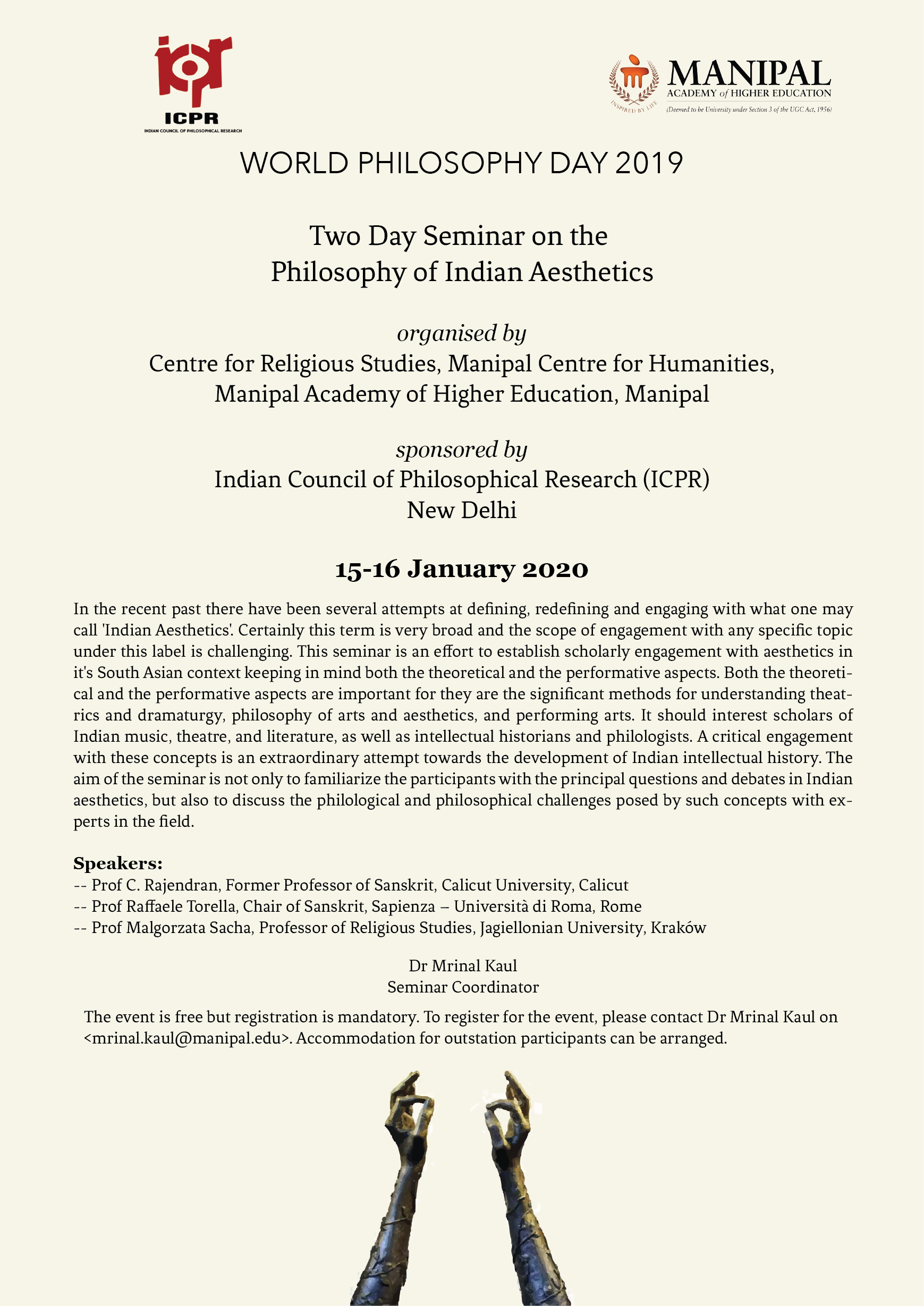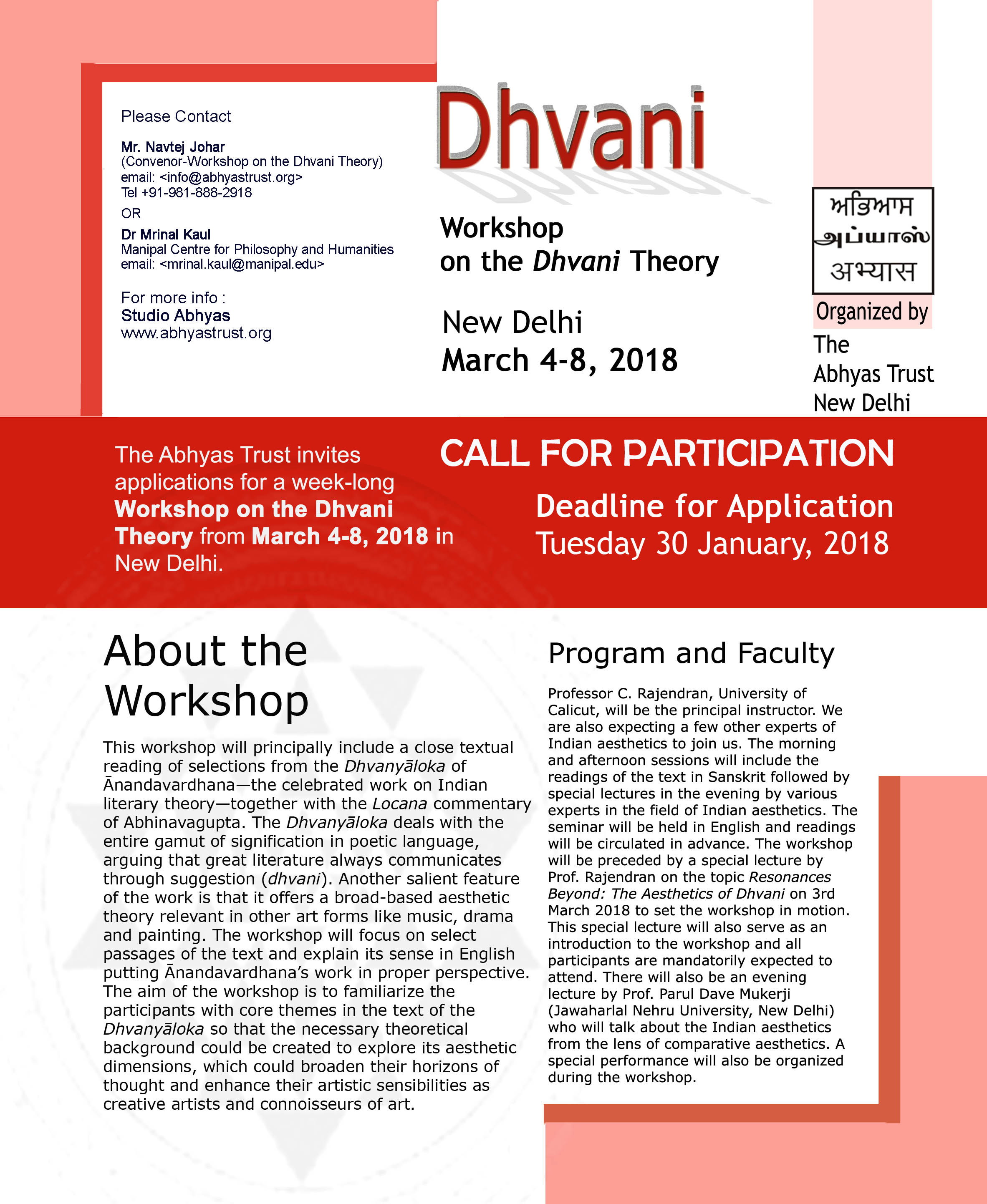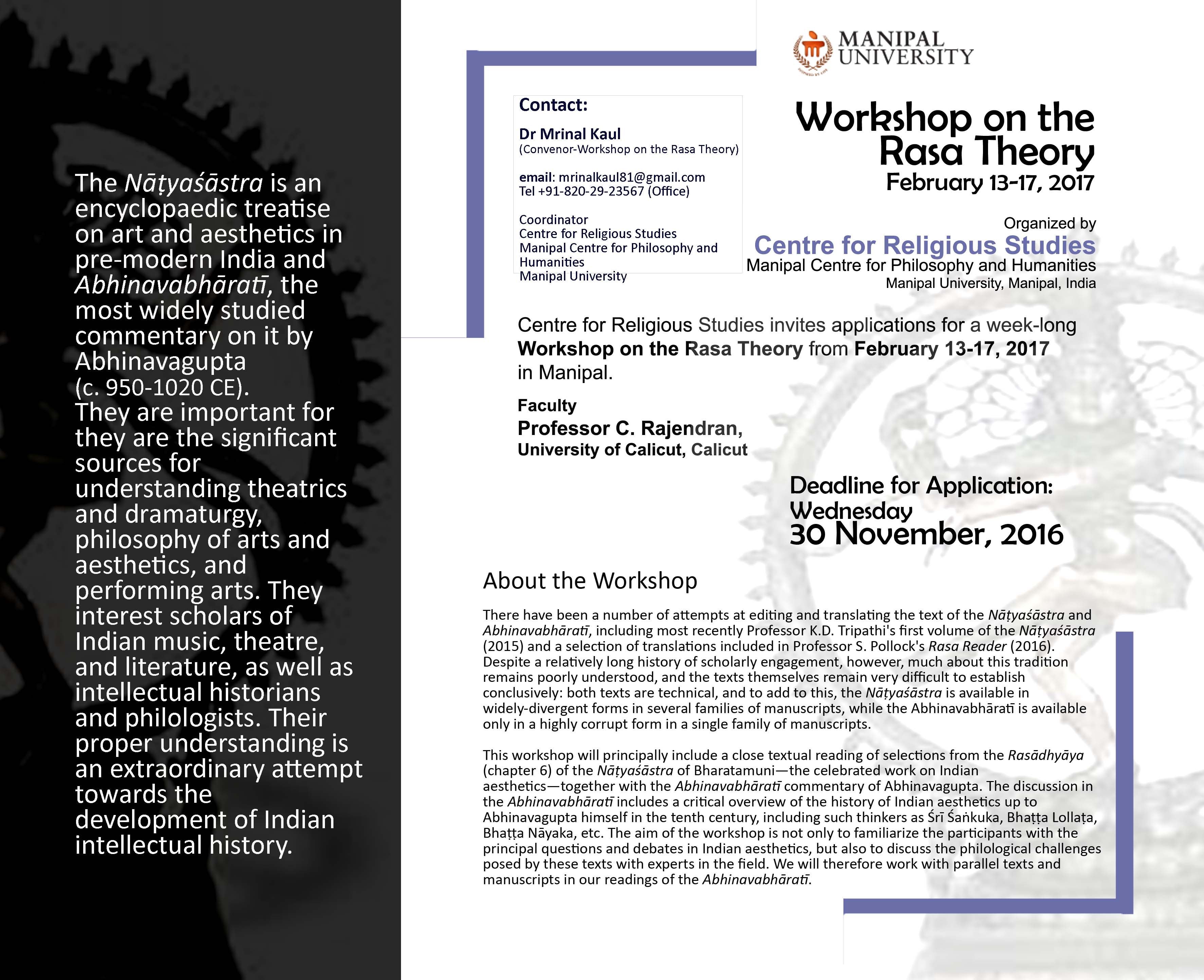
Category: Indology
Abhinavagupta on ‘Reflection’ by Mrinal Kaul
There is a certain level of complexity attached to the idea of ‘reflection’ in Abhinavagupta (fl.c. 975-1025 CE) and it is discussed by him at various intellectual platforms. At one level it is a debate between the realists and the absolute idealists where Abhinavagupta is obviously seeing ‘reflection’ as an absolutely idealistic notion. However, realism is not rejected by these Śaiva non-dualists. Following the tradition of his masters Abhinavagupta is attempting to establish the ‘realism of idealism’ or as K.C.Pandey (1963) would call it ‘Realistic Idealism’. Abhinavagupta uses mirror-trope to explain away this fundamental idea. His idea of reflection should be understood as a subjective idea of self-reflexive awareness that has the autonomous potential to exist or manifest by itself. It does not need external support like, for instance, an image of face cannot exist in a mirror if there is no face in front of it. To put it in other words that even the so called illusory objects are understood to be as real as the real objects themselves.
At another level it becomes the problem of subject and object where apart from radically shifting the hermeneutic reins into the hands of ‘a’ subject there is a strong attempt to establish the absolutely autonomous and self-sufficient nature of ‘the’ subject that should be understood as beyond the binary of the realistic notion of both subject and object. From the absolute point of view it is the undifferentiated Consciousness alone that is beyond the notion of subject and object yet containing within itself the differentiated nature of both.
The question I have posed is if at all we should ignore the novelty of Abhinavagupta’s Śaiva theory of reflection in his works other than those related to the Pratyabhijñā epistemology of recognition where only the pure analytical justification for reflection is discussed. As I have argued that Abhinavagupta’s basic philosophical intuition is embedded in the Krama tradition. His vision of reality is both mystical and erotic following a deep symbolic-ritual scheme. And this depth can only be overcome when Abhinavagupta is studied across the scriptural traditions that he is a part of.
Who is afraid of ‘Philosophy’ in India?
For past couple of decades, the idea of liberal arts in higher education in India is going through a process of churning. As a part of this a number of educational platforms have come to the forefront. Continue reading….
Scholars, not guardians
Sanskrit scholarship must not be trapped in outsider/insider dichotomy. Its task is to understand tradition, engage with other systems.
Article Link:
Dhvani Workshop, New Delhi (March 4-8, 2018)
Organized by
The Abhyas Trust, New Delhi
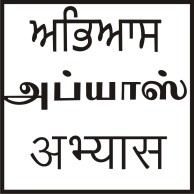
The Abhyas Trust invites applications for a week-long Workshop on the Dhvani Theory from March 4-8, 2018, at New Delhi.
The workshop will commence with a public lecture by Prof C Rajendran, titled Resonance Beyond: The Aesthetics of Dhvani, at the Gulmohar Hall, India Habitat Centre, New Delhi, on 3rd March 2018, at 7 p.m.
About the Workshop
This workshop will principally include a close textual reading of selections from the Dhvanyāloka of Ānandavardhana—the celebrated work on Indian literary theory—together with the Locana commentary of Abhinavagupta. The Dhvanyāloka deals with the entire gamut of signification in poetic language, arguing that great literature always communicates through suggestion (dhvani). Another salient feature of the work is that it offers a broad-based aesthetic theory relevant in other art forms like music, drama and painting. The workshop will focus on select passages of the text and explain its sense in English putting Ānandavardhana’s work in proper perspective. The aim of the workshop is to familiarize the participants with core themes in the text of the Dhvanyāloka so that the necessary theoretical background could be created to explore its aesthetic dimensions, which could broaden their horizons of thought and enhance their artistic sensibilities as creative artists and connoisseurs of art.
Deadline for Application: Tuesday 30 January, 2018
Program and Faculty
Professor C. Rajendran, University of Calicut, Calicut will be the principal instructor. We are also expecting a few other experts of Indian aesthetics to join us. The morning and afternoon sessions will include the readings of the text in Sanskrit followed by special lectures in the evening by various experts in the field of Indian aesthetics. The seminar will be held in English and readings will be circulated in advance. The workshop will be preceded by a special lecture by Prof Rajendran on the topic Resonances Beyond: The Aesthetics of Dhvani on 3rd March 2018 to set the workshop in motion. This special lecture will also serve as an introduction to the workshop and all participants are mandatorily expected to attend. There will also be an evening lecture by Prof. Parul Dave Mukerji (Jawaharlal Nehru University, New Delhi) who will talk about the Indian aesthetics from the lens of comparative aesthetics. Prof. Milind Wakankar (IIT-New Delhi) and Dr. Malcolm Keating (Yale-NUS College in Singapore) will also deliver lectures. A special performance will also be organized during the workshop.
Confirmed Scholar Participants
Prof. Parul Dave Mukerji, Jawaharlal Nehru University, New Delhi
Dr. Mrinal Kaul, Manipal Centre for Philosophy and Humanities, Manipal, Karnataka
Dr. Malcolm Keating, Yale-NUS College in Singapore
Prof. Milind Wakankar, Indian Institute of Technology, New Delhi
Selection Criteria
Though a rudimentary knowledge of the Sanskrit language on part of the participants would definitely help, the workshop does not presuppose any theoretical background of textual scholarship. We seek interested research students and scholars from across India and abroad. The selection will be made based on the strength of the application. We cannot accept more than 25 participants and the priority will be given to the applications from research scholars in disciplines or with experience in Sanskrit, Philosophy, Aesthetics, Yoga, Performing Arts, Religion and Literature. There will be a participation fee for all participants. Applicants will be informed about the decision of selection after the deadline of application.
Location and Accommodations
The event will be held at Studio Abhyas, 112 Anand Lok (basement), New Delhi. Centrally located in South Delhi, the studio is close to all the major cultural venues of the capital and easily accessible; it is also close to the Metro line. A registration fee will be charged that includes a working lunch, tea/coffee with snacks for the five days of the workshop. Travel cost will not be reimbursed. Unfortunately, we are not in a position to offer accomodation.
Registration Fees
Registration is mandatory for attending the workshop. No participation without due registration will be allowed.
Regular Participants: Rs. 4000
Student Participants: Rs. 3000
Application Information
Applications should include the following, preferably sent as PDFs:
1. Description of research interests and their relevance to the topic of the workshop (max. 300 words)
2. Brief Curriculum Vitae / resume highlighting relevant skills, experience and training.
Applications should be sent to:
Navtej Johar
(Convenor-Workshop on the Dhvani Theory)
Studio Abhyas
F 27 Green Park, New Delhi 110016
India
email: <info@abhyastrust.org>
Tel +91-981-888-2918
For more information please contact Studio Abhyas
Call for Participation: (ICPR) Workshop on Trika Philosophy of Kashmir, Lucknow (February 15 – 28, 2018)
Workshop on Trika Philosophy of Kashmir
(Reading of Abhinavagupta’s Īśvara-pratyabhijñā-vimarśinī Jñādhikāra: Last Four Chapters)
The Indian Council of Philosophical Research (ICPR) is organizing a fourteen-day workshop from February 15 – 28, 2018 on Pratyabhijñā philosophy, the epistemological school of the Trika Śaivism. The workshop constitutes the Phase-II of the Level Three annual workshop as part of the four-year programme that aims at studying-in-depth the entire text of the Īśvara-pratyabhijñā-vimarśinī by the celebrated Abhinavagupta on his master Utpaladeva’s Īśvara-pratyabhijñā-kārikā, the path setting prasthāna text of the system. The sole purpose in the phase-II is to cover the last 4 chapters of the Book on Knowledge called Jñādhikāra. In this part our masters deconstruct the established paradigms of Indian philosophical discourse (specially those of Buddhist logicians) and reconstruct a system of logic defined by life-affirming world-view via core concepts of Prakaśa, Vimarśa, Vikalpa, Vāk et al encompassing within their ambit issues of logic, language, metaphysics and aesthetics, fully underscoring the need of “bringing psychology in accord with metaphysics” (to borrow an expression from Prof. TRV Murti) as integrated within a robust system of philosophical discipline which could be construed as integral dynamic absolutism. Understood in this way, the Vimarśinī claiming to be a Samyak Vyākhyāna (proper and comprehensive exposition) of the original Pratyabhijñā-Kārīkas (a text in the āgamic tradition), offers a counter perspective to the prevalent narrative of Kashmir Śaivism as a tantra-based doctrinal school and projects Utpala and Abhinavagupta as logician-metaphysicians par excellence in their own right.
The workshop will primarily have two parts – namely, reading of the core text and concerted theme lectures covering the issues raised in the text and/or the prima facie stand-points necessary for navigating the text. The basic purpose of these workshops including the one in hand is to prepare the new generation of young Indian scholars in an area which is suffering from the acute scholarship-deficit by enabling them to have first hand exposure to the original thought structure and methodology of the masters through their primary textual articulations.
The workshop will be conducted at the Lucknow Academic Centre of ICPR by Prof. Navjivan Rastogi, the Course Director and Coordinator, together with other eminent scholars such as Goswami Shyam Manohar ji, Professors K.D. Tripathi, Rajneesh Kr. Shukla, Mithilesh Chaturvedi, Ambikadatta Sharma, Sacchidanand Mishra, Prakash Pandey and Drs. Meera Rastogi, Balram Shukla and others. Besides participants would be encouraged to proactively interact among themselves. For this a few sessions could be exclusively earmarked.
Each day of the workshop will have two academic sessions i.e., from 10:30 a.m. to 1:30 p.m. and 2:30 p.m. to 5:30 p.m. with a lunch break from 1:30 p.m. to 2:30 p.m.
The workshop will be open to all those who are interested in Kashmir Śaivism. As such faculty members and research scholars in the departments of philosophy/Indian philosophy, departments of Sanskrit with philosophy as one of its courses (including Sanskrit Universities) and also those who are connected with academic centres and institutions operating in the similar field will be eligible to apply. However preference will be given to the participants of earlier workshops. The candidates must bear in their mind that this workshop constitutes the 2nd leg of a four-year workshop programme. Hence those candidates who have participated in earlier workshops and undertake to participate in future ones as well will claim preference.
Those interested should apply online here.
Deadline for application: 31 October 2017
Pandit Vrajvallabh Dwivedi and Prof Alexis Sanderson in 1987
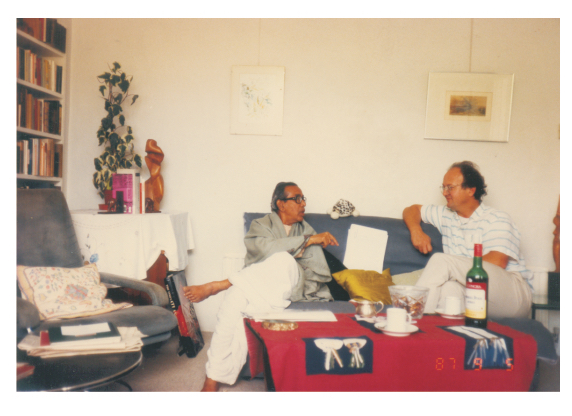
Courtesy: Dr Tarun Dwivedi

